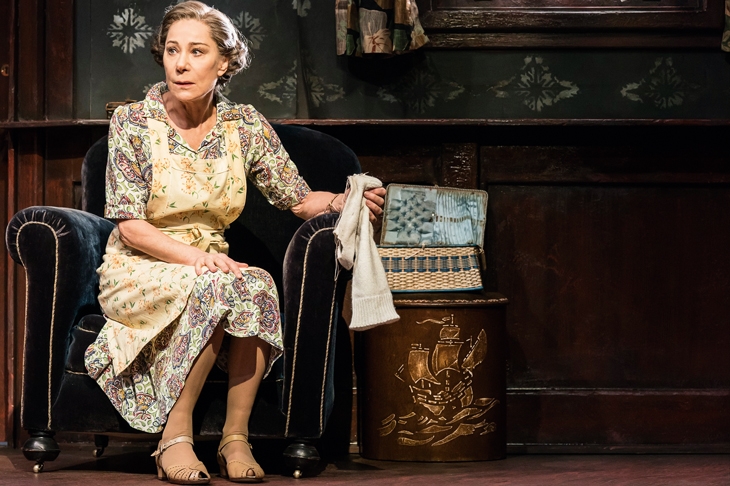The Birthday Party is among Pinter’s earliest and strangest works. It deconstructs the conventions of a repertory thriller but doesn’t bother to reassemble them. The setting is a derelict seaside town on the south coast. Petey, a thick deckchair attendant, runs a guest-house with his ageing wife, Meg. She’s a zero-IQ cook whose signature dish is a slice of white toast charred in fat. They have one resident, Stanley, a former pianist whom Meg cossets and mothers like a substitute son. Enter two London thugs, Goldberg and McCann, who invite Stanley to a party as a pretext to punish him for unknown misdemeanours. The whisky-soaked celebrations involve a game of blind man’s bluff during which Stanley’s glasses are smashed, rendering him sightless. The evening ends in confusion with an attempted strangulation, a possible rape and an obscure off-stage torture session. Next day the thugs carry Stanley away for medical treatment, or so they claim.
This muddled play failed to please audiences when it first appeared and its status as ‘a masterpiece’ makes it tricky to produce even now. Parts of the script are more trouble than they’re worth. Luckily, the director Ian Rickson knows where they are and how to deal with them. McCann’s annoying habit of tearing newspapers into strips is played down. So is Goldberg’s temporary identity crisis in the second half. The long interrogation scene, often regarded as the most disturbing passage in all Pinter, is nothing more than a repetitive and humourless chunk of verbal slapstick. Here the actors rattle through it in double-quick time.
And then there’s the business with the drum. At the close of the first act, Meg presents Stanley with a child’s drum as a substitute for the piano he can no longer play. Stanley slings the toy over his neck and marches around like a soldier whacking it crazily. Later he treads on it by accident and destroys it. Clearly the drum represents something: thwarted parenthood, powerless infantilism, corrupted musicianship, the repetitive cacophony of a damaged intellect, the attention-seeking desperation of a failed artist. You name it. But none of these symbols can possibly reach the play-goer in the theatre who simply sees an actor hitting and breaking a prop. And yet the drum can inspire long screeds of erudite speculation from Pinter anoraks lodged in universities around the world. And here lies the Pinter conundrum. Theoreticians adore him but audiences are more sceptical.
This cheerful, pacey, superficial production is determined to generate laughs rather than footnotes. Zoë Wanamaker works wonders with Meg and turns her into a monument of blithering stupidity. Toby Jones’s crumpled defiance is amusing enough but at 51 he’s too ramshackle to play Stanley, whose age is specified as ‘late 30s’. And he lacks the physique to stand up to his abductors so his attempt to challenge them rings a little false. Goldberg and McCann are often performed as two halves of a double act but here they’re carefully differentiated. Tom Vaughan-Lawlor plays McCann as a sort of angry flagpole, clattering and tinkling in furious self-absorption. And he’s entirely dominated by Stephen Mangan who gives Goldberg an effusive comic menace. Mangan glides about the stage like Bruce Forsyth on top form, smiling and bantering, filling the air with aggressive inanities. His spiky merriment uncovers a truth about the character: a successful thug must be a talented street performer, full of feints and tricks, and lightning-quick ripostes. This production is a delight because it doesn’t bore or baffle anyone. For a Pinter play, these are important and rare bonuses.
The Claim is about Serge, an African refugee, whose back story is confused and contradictory. He states that he comes from Streatham but he later admits that he’s Congolese and has spent years in Uganda. He’s helped by a gormless male interpreter who talks about himself all the time and equates the hopes of African asylum-seekers with the choices faced by Brits selecting a Greek island for their hols. Serge is passed to a black female claims manager who treats his case far more sceptically than her white colleague. Is that because she’s black, like Serge? This intriguing play won’t tell us. The plot turns on a tiny but fatal error of interpretation. Describing a violent episode in his childhood, Serge says he was in possession of ‘gum’. The translator uses the word ‘gun’. Serge is duly classified as a terrorist. When he discovers the mistake, he tries to correct it but his efforts are taken as further proof of his criminal character.
This is a small, brief play with just three actors talking at each other on a near-empty set. Cheapskate minimalism is the ruling aesthetic here — its neon lights wouldn’t look out of place on a traffic island. And yet the piece is unnerving, absorbing and full of deliciously nasty surprises.







Comments